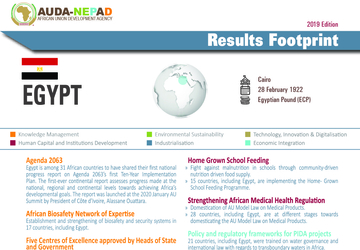 Egypt
Egypt
Official Name: Arab Republic of Egypt
Capital: Cairo
Independence Day: 28 February 1922
Currency: Egyptian Pound (EGP)
Key Result
Egypt is leading the process of developing an African Common Position (ACP) to the HLM and EU on enhancing country results frameworks. Egypt is also among the countries that received advocacy support, which contributed to strengthening of negotiation capacities of African countries on the Post-2015 Development Agenda through the Common African Position (CAP). Subsequently, Africa’s development priorities were mirrored in the new Sustainable Development Goals (SDGs).
A full database on the status of innovation has been developed, focusing on product and process innovations and to some extent the organisational and marketing innovations.
The country leads the construction of a navigational line between Lake Victoria and the Mediterranean sea. The project integrates river, road and rail transport in the Nile basin and was endorsed by Ministers of Transport, ICT and Energy in September 2013 and is expected to benefit nine countries.
Egypt is also benefiting from the Trans-Maghreb Highway project, which is designed to improve travel for people and goods across the Maghreb countries. The project includes the implementation of a smart corridor system along the highway with one-stop-border posts.
The country has joined the Sustainable Energy for All (SE4ALL) Initiative, which aims to achieve universal access to sustainable energy by 2030, and the Paris Climate Agreement, which calls for reducing greenhouse gas emissions to limit climate warming to below 2 degrees Celsius.
Related
Projects

A critical AU Model Law aimed at harmonizing medical products regulatory systems in Africa was endorsed by African Heads of State and Government at the January 2016 AU Summit in Addis Ababa, Ethiopia. The AU Model Law will contribute towards accelerate the regulation of safe, quality and affordable medical products and technologies in Egypt.

Measuring the Cost of Hunger in Africa: This study was completed in 4 countries (Egypt, Ethiopia, Swaziland and Uganda). The overarching objective of the multi-country study led by the AUC, NEPAD, WFP and UNECA, is to catalyse coordinated action and inform the design of nutrition-oriented policy frameworks and programmes, with greater investments to eradicate child undernutrition on the continent.
10 findings from the first phase of the “Measuring the Cost of hunger” study:
- There are more stunted children in Africa today than there were 20 years ago.
- 69 to 82 per cent of all cases of child undernutrition are not properly treated.
- Most of the health costs associated with undernutrition occur before the child turns one year old
- 4 between 7 and 16 per cent of grade repetitions at schools are associated with stunting.
- Stunted children complete 0.2 to 1.2 years less in school education.
- 8 to 28 per cent of all child mortality is associated with undernutrition.
- Child mortality associated with undernutrition has reduced national workforces by between 1 and 8 per cent
- 40 to 67 per cent of working-age populations suffered from stunting as children.
- The annual costs associated with child undernutrition reach values equivalent to 1.9 to 16.5 per cent of gross domestic product.
- Eliminating stunting in africa is a necessary step for inclusive development on the continent.

Egypt re-embarked on preparatory steps towards official launch of CAADP implementation.

Project : TAH programme
Description : This is phase I of the continental connectivity programme that focuses on completion and standardisation of the TAH missing links by 2030
Project : Single African Sky phase 1 (design and initial implementation)
Description : Single African Sky is a continental programme that will create a high-level, satellite-based air navigation system for the African continent
Project : Yamoussoukro Decision implementation
Description : Accelerate Yamoussoukro Decision implementation by identifying countries that are ready to fully implement it, and discussing and agreeing with both their governments and airlines to launch the voluntary club on a full membership basis;
Project : ICT Enabling Environment
Description : This programme would improve the environment for the private sectors to invest in high-speed broadband infrastructure
Project : ICT Terrestrial for Connectivity
Description : This programme has two main components : secure each country connection by at least two broadband infrastructure and ensure the access to submarine cable to all landlocked countries
Project : Internet Exchange Point (IXP) programme
Description : The aim of this programme is to provide Africa with adequate internet node exchange to maximise internal traffic
Project : North–South Power Transmission Corridor
Description : 8,000 km line from Egypt through Sudan, South Sudan, Ethiopia, Kenya, Malawi, Mozambique, Zambia, Zimbabwe to South Africa
Project : North Africa Transmission (DFS)
Description : 2,700 km line from Morocco to Egypt through Algeria, Tunisia and Libya
Project : Trans-Maghreb Highway
Description : This programme is designed to improve travel for people and goods across the Maghreb countries, which have had their trade and travel limited by artificial barriers between countries at the borders. This programme would design and implement a smart corridor system along the highway and install one-stop border posts

- 30 staff members (with 18 women) of the AMCEN support unit and the Egyptian Environment Agency Affairs (EEAA) were capacitated on Project Planning and Logical Framework, Proposal writing, Project Management, Monitoring and Evaluation.
- 30 staff members (with 13 women) of the AMCEN support unit and the Egyptian Environment Agency Affairs (EEAA) were capacitated on issues and management of degradation, desertification and climate change in Africa.
- Capacity of 32 journalists from different Egyptian media to better report emerging African environmental challenges were enhanced
- Project concepts and proposals developed for submission to the developing partners for financial and technical support to the EEAA in the areas of capacity building and climate change adaptation efforts in Egypt.
- Draft report for the implementation of the Africa Regional Flagship programmes was produced
- Regional cooperation in the area of land degradation and climate change was enhanced and regional network for information sharing was established between 7 African countries (Algeria, Egypt, Ethiopia, Kenya, Namibia, Sudan and South Sudan).
- The project identified 5 techniques/measures to adapt to land degradation and desertification in Egypt as follows:-
- Application of remote sensing on "monitoring desertification in Egypt" after establishing the baseline data.
- Program of green belt.
- Land coverage with different grasses and shrubs to reduce the impact of overgrazing as a major cause for land degradation
- Genetic biodiversity conservation in Egypt
- Utilization of species Moranga in the desert areas.


Advocacy and Strengthening of Negotiation Capacities on Post-2015 Development Agenda through the Common African Position (CAP)
Global Partnership for Effective Development Cooperation (GPEDC)
The Global Partnership is an inclusive political forum bringing together governments, bilateral and multilateral organisations, civil society and representatives from parliaments and the private sector, committed to strengthening the effectiveness of development co-operation to produce maximum impact for development. Through its multi-stakeholder platform, the Global Partnership provides support, guidance and shares knowledge to boost development impact with a strong country focus, and to ensure a degree of coherence and collaboration among all development stakeholders on co-operation flows and policies. It offers a global mechanism to ensure co-operation is based on Busan principles of ownership, results, inclusiveness; and transparency and accountability to deliver tangible results on the new SDGs. NEPAD Agency is the Africa’s Secretariat for the Global Partnership.

Description : The use of political gravitas and goodwill to unblock and facilitate political bottlenecks affecting the implementation of ICT broadband and optic fibre projects on the continent
Project : Construction of Navigational Line between Lake Victoria and the Mediterranean Sea
Description : This project has various components focusing on water management and intermodal transport


"At the beginning of 2014, 37 of the 42 opted-in African countries have completed a rapid assessment / gap analysis. The next step for countries is to develop a SE4LL Action Agenda and Investment Prospectus(es). To support this process, the SE4ALL Africa Hub partners have led the development of Africa Guidelines for SE4ALL national Action Agendas. The Africa Guidelines lay out principles and process for developing Action Agendas and put forward a balanced approach of centralized and decentralized solutions to achieve universal access to energy services.
Progress in Egypt:
Joined SE4All initiative"
you agree to the AUDA-NEPAD Privacy Policy.


